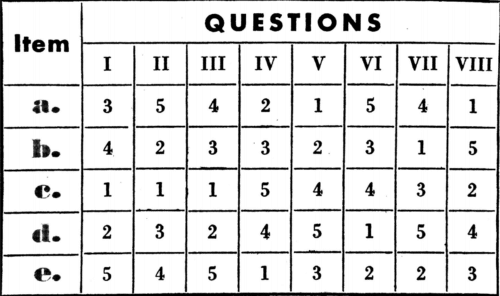Editor’s note: The following quiz comes from a book published in 1928, What Is Your Emotional Age? by J. George Frederick. While quizzes have the reputation of being a little hokey, I actually find them useful as a prompt for a bit of self-reflection. This particular one, while vintage in source, is quite apropos for a time in which many guys seem to take things too literally, and themselves too seriously. We’ve loaded the quiz into an interactive platform so you can take it without having to tally up the score yourself. We’ve also kept the text and answer key below it, in case you’d like to take it by hand.
Are you a good sport? Can you be the “goat” and like it? Here’s a chance for you to test your sense of humor and to include best friends and family.
Check the one item under each question that comes closest to describing what you believe would be your most typical reaction under the circumstances. Be sure to check yourself as you really are, not as you would like to be. Then, after you have checked a situation under each of the eight questions, check the answer key. You’ll be surprised — pleasantly, we hope!
I. If I were with a gang who laughed when some one said in banter, “We all saw you purposely drop your handkerchief so the good-looking stranger would notice you”:
a. I’d pretend I didn’t hear the remark.
b. I’d join with the others in the fun.
c. I’d probably feel hurt and leave them immediately.
d. I’d curtly tell them that jealousy prompted their petty wit.
e. I’d reply with some wisecrack like, “To the victor belong the spoils.”
II. When I am the “goat” — a toy mouse under my chair, salt poured by the prankster into my cup of coffee, or choose your own practical joke:
a. I play up to the situation, providing all the possible entertainment.
b. I wait my chance and repay the “wise guys” in their own coin.
c. I show my displeasure or reprove them in some obvious way.
d. I ignore the incident and turn my attention to other matters.
e. I enjoy the situation as much as any of the jokesters.
III. When some one in a group tells a joke or funny story about Pat and Mike that I’ve heard before:
a. I try to act as delighted and appreciative as when I first heard it.
b. I smile wanly and say it’s a good joke.
c. I stop the person in the middle of the joke with, “I’ve heard that one before.”
d. I let the person tell the joke, but I look sour.
e. I laugh heartily and say, “That reminds me of a similar story.”
IV. When the comedian on the stage has the audience in stitches by his crazy antics:
a. I wonder what the audience can see in his crazy acts and remarks.
b. I am as amused by the audience as by the comedian.
c. I join with the audience in its hearty merriment — laughing with the best of them.
d. I enjoy some of the humor — chuckling to myself.
e. I am usually fed up and leave the place.
V. When I am explaining the brave deed I performed and some one acidly remarks, “My heroine, how wonderful you are”:
a. I feel embarrassed and irritated by the remark.
b. I reply, “Of course, but not nearly so wonderful as you would be.”
c. I say, “Sorry, but you can’t get my goat that way.”
d. I thoroughly enjoy the situation and laugh at myself.
e. I disregard the interruption and proceed seriously with my story.
VI. When one of my friends “takes me off” — disclosing and imitating my unique, individual mannerisms — before a crowd of people who all know me:
a. I join fully and sincerely in the spirit of fun.
b. I find it difficult to hide my hurt vanity and pride.
c. I say that the “take-off” is grand and that it is very entertaining.
d. I tend to show my resentment by some biting remark.
e. I always think such forms of humor are cheap and degrading.
VII. When I’ve taken that unintentional and harmless spill on the ice, wet pavement, stairs, or rug:
a. I understand the humor occasioned by such an incident.
b. I resent the fact that some persons use another’s misfortune for their fun.
c. I hide my hurt feelings under the cover of a laugh at myself.
d. I jocosely remark that I’ll have to have the offending object removed from my path.
e. I am irritated at my own clumsiness and spill a few tears.
VIII. When the party grows dull and drags along monotonously:
a. I grow dull and monotonous with the party.
b. I’m the so-called life of the party who tries to think of things to do to pep it up.
c. I try to aid and abet anyone in providing impromptu wit.
d. I try to stimulate some of the amateur wits to do their stuff.
e. I accept the course of events, doing nothing about it.
Answer Key
Draw circles around the numbers that correspond to the items you checked — one in each of the eight columns. If, for instance, you checked item “d” under Question I, you would circle the number on line “d” under column I — number 2, in this case.

To get the score for your sense of humor add the numbers you circled for all of the questions.
- if the sum is below 20, your sense of humor can be improved
- between 20 and 30 you are average
- between 31 and 40 your sense of humor is way above par — or you’ve been generous with yourself.



